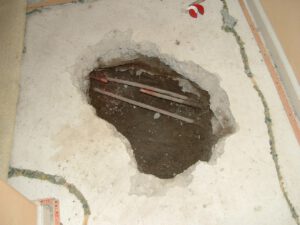Slab leaks occur when the water pipes that supply your house are leaking underneath your foundation. Often, homeowners don’t realize they have a slab leak until it causes major damage to their property and costs them a fortune in repairs.
Luckily, there are some key signs you can watch for that will tell you whether or not you have a slab leak. If you notice one or all of these signs, you should get it fixed immediately!
A slab leak in the pipes that run underneath your home’s concrete foundation can cause a dramatic decrease in water pressure. This can make it difficult to shower, wash dishes, or even get a hot bath.
Low water pressure is a common problem for homes with old pipes, especially those made of galvanized steel. It can also be caused by issues at the water treatment plant, such as when construction temporarily reduces the amount of water that your city can deliver to homes.
Another reason why water pressure may go down is if your plumbing isn’t properly insulated. This can cause rust and moisture to build up in the pipe, which restricts the flow of water.
Slab leaks can also be caused by a poor pH balance in the water or contaminants that corrode copper pipes. If these factors are not corrected, you could end up with a leak in the pipes that run under your home’s foundation.
One of the best ways to detect a leak is to have your home inspected by a licensed professional. This can help prevent a costly slab leak from happening in the first place.
Once a plumber has identified the problem, they can then repair the leak. This can often be done without breaking through your home’s concrete foundation.
A plumber can use a variety of tools to locate a slab leak, including acoustic discs and ground microphones that can hear the sounds that escaping water makes. These tools can help narrow down the location of the leak without cutting through your concrete slab foundation.
The water that leaks through a home’s slab can cause damage to its flooring. Carpet can become damp and dark, while wood flooring develops warped floorboards. This is a common effect of slab leaks and can lead to costly repair or replacement costs.
Cupping is the most mild form of floor damage and can usually be remedied by restoring proper humidity to the room. The result is a slight buckling along the length of each plank, which can be flattened with heavy objects or nailed down and covered up with caulk.
If this doesn’t work, however, you might be dealing with serious damage, which will require major repairs or complete replacement. Fortunately, cupping can often be fixed in some cases by removing the damaged boards and replacing them with new ones.
Warping is a more serious issue, and it can be harder to correct. When wood is warped, the boards are unable to rest flat on the subfloor. The edges of the boards can also start to buckle, and the floors may even begin to split at the edges.
When this happens, you need to call in professional help immediately. The best thing to do is enlist a plumber who can assess the situation and fix the problem before it gets worse.
Slab leaks can cause less water pressure to flow through your pipes. This is especially true when the leak originates from underneath the concrete foundation of your house.
This means that the water pressure at your faucets and other fixtures will be lower than normal, which can also make your water bill skyrocket. This is a clear sign that you have a slab leak, so be sure to contact a plumber if you notice this issue.